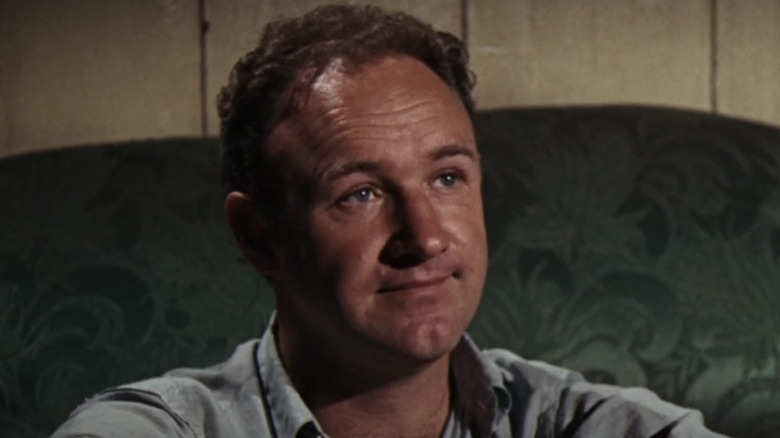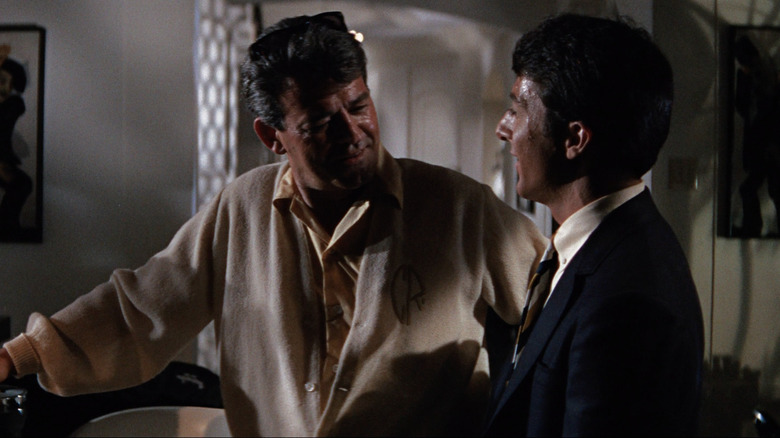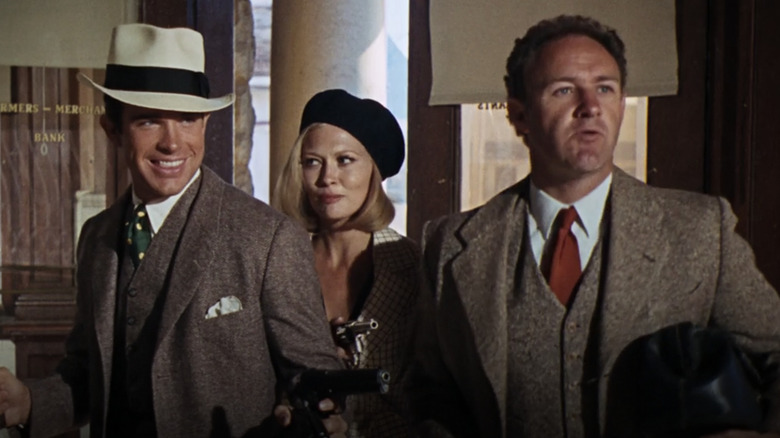The Reason Gene Hackman Was Fired From The Graduate
Nobody likes to be fired, especially if you are still trying to find solid footing within your profession. Getting fired amplifies every single insecurity within yourself, but sometimes the job just was not meant to be. But when it comes to acting, getting fired is probably even rarer than in most other jobs. Films and TV shows typically occur under a strict time crunch, and recasting a character in the middle of production costs a tremendous amount of money, since you have to reshoot everything again with the new actor. The filmmakers really have to know that a person is not right for the part for them to actually pull the trigger on the firing. The other devastating thing about being fired as an actor is it may have absolutely nothing with what you can do as a performer. You could be the most versatile, extraordinary actor, but if you are five inches too short, you are booted from contention.
To prove that getting fired from a movie could have almost no bearing on your acting prowess, one of the greatest actors to ever be in movies was fired from Mike Nichols' seminal New Hollywood classic "The Graduate." This man would go on to be one of Hollywood's most dependable leading men and would win the Academy Award for Best Actor just a few years later for "The French Connection." Of course, we're talking about the great Gene Hackman. Even someone as utterly compelling on screen as Hackman could be fired, and the reason for it was completely out of his hands.
Just not old enough
Gene Hackman was originally cast in "The Graduate" in the role of Mr. Robinson, the cuckolded husband of Anne Bancroft's Mrs. Robinson, who has an affair with Dustin Hoffman's recent college graduate Benjamin Braddock. He and Hoffman had been roommates and friends, so I am sure their natural chemistry appealed greatly to Mike Nichols. Hackman shot for three weeks on the picture, but it became clear for everyone involved that it just was not working. Dustin Hoffman recalls to Vanity Fair about the tension:
"Gene said to me while he was taking a leak in the men's room ... 'I think I'm getting fired.' And he was, and I thought I was next. So by the time we started shooting I was on pins and needles, terrified that Mike didn't like what I was doing. He was never satisfied; he was always looking for the exquisite take. I was dubbed a perfectionist for years, and all I could think was 'I learned from Mike Nichols.'"
So Mike Nichols fired Gene Hackman. The reason why the pieces were not gelling together was that Hackman was just too young to be playing Mr. Robinson. He is only seven years older than Hoffman, and while he certainly had some early male pattern baldness, he did not look remarkably older than Hoffman, which the character was supposed to be. I mean, he is supposed to have a daughter that is Benjamin's age, and I don't think he became a dad when he was seven years old. Strangely enough, Anne Bancroft was only six years older than Hoffman playing Mrs. Robinson, but through performance and makeup, that gap was able to be more apparent.
Mike Nichols said of Hackman and Hoffman's age difference, "Unlike Anne and Dustin, in the parts of Benjamin and Mrs. Robinson, the actors needed to be a whole generation apart," but of Hoffman and Bancroft's ability to convincingly play that generation gap, Nichols offers a great two-word compliment, "That's acting."
After Hackman's firing, the role of Mr. Robinson was assumed by veteran character actor Murray Hamilton, probably best known for his role as the mayor a few years later in "Jaws." He and Hoffman had a 14-year age gap between them, and Hamilton had a head of gray hair. The distinct generations were very clear, and Hamilton delivers a wonderful performance. For the good of "The Graduate," things worked out for the best, even if it meant sending one of the best actors in American film history home packing.
1967 still worked out for Hackman
While Hackman's firing could have been a terrible tragedy that sent him into unemployment and a life thinking of what could have been, Gene Hackman ended up having a terrific 1967, the year "The Graduate" was released. He appeared in a whopping total of five films that year. Four of them were very small, supporting parts in films not many people saw and are barely remembered today. Anybody watched the Robert Wagner starring golfer drama "Banning" recently? I thought not. That fifth film though was an absolute game changer.
Gene Hackman booked the key role of Buck Barrow in the New Hollywood gangster film "Bonnie and Clyde," a film that completely upended the film industry, alongside Warren Beatty and Faye Dunaway. Hackman earned his first Academy Award nomination for Best Supporting Actor for his performance in the film, and because of this film's reach and impact, his career started to really take off.
Who knows if Gene Hackman would have still been able to do "Bonnie and Clyde" had he not been fired from "The Graduate" all those years ago/ While Mr. Robinson is a very good part, it doesn't hold a candle to Buck Barrow in terms of visibility and ability to hold the screen. Even just from the way they are shot, with Mr. Robinson's almost always covered with shadow, determines that visibility. Buck gave Hackman the opportunity to play so many different colors, both comedically and dramatically. He's a bit of lightning bolt in "Bonnie and Clyde," forcing you to take notice of him. Without that role, I don't think we see Gene Hackman become the huge star he was. In the end, everything worked out the way it was supposed to. "The Graduate" got its perfect Mr. Robinson, and Gene Hackman got the role that made him a star, and the rest is history.


